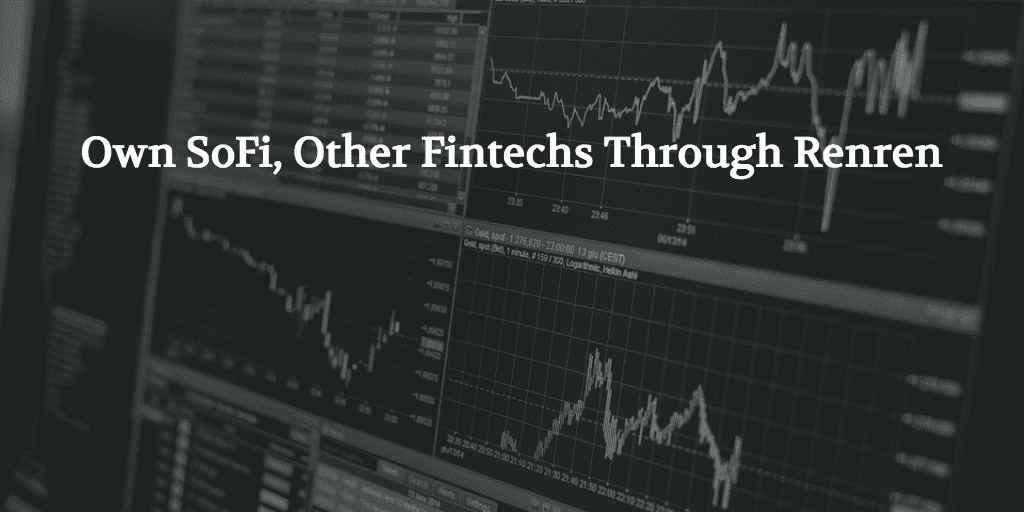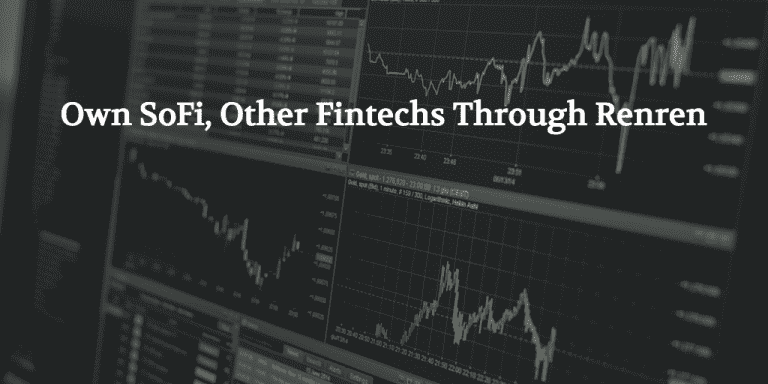
There are no shortage of VC firms who have allocated dollars to various fintechs throughout the world. But for individual investors it is difficult to get exposure to fintech companies because so few have actually gone public. There is one company called Renren that has allocated to numerous fintech firms and is currently publicly traded on the NYSE under symbol RENN.
The company operates a real name social networking platform in China but has most recently made investments in fintech businesses which will be the focus of this post.
Most notable investments from a US perspective include SoFi, Lending Home, Motif Investing and Fundrise. Renren has participated in SoFi’s series B, D, E and F rounds for a total investment of over $242 million. According to the 2015 year end report, “The Company held 28.85% and 21.20% equity interest of SoFi as of December 31, 2014 and 2015, respectively.” While we don’t have updated numbers, Renren owns a significant interest in SoFi, which continues to buck the trends of their competitors. The below table was taken from Renren’s 2015 year end earnings report and highlights their top fintech investments.
| Investment | Location | Cost (thousands) | Ownership % | Portfolio % |
| SoFi 1 | San Francisco | $235,920 | 21.2% | 58% |
| Lending Home | San Francisco | $65,843 | 14.7% | 16% |
| Motif Investing | San Mateo | $40,000 | 10% | 10% |
| Snowball Finance 2 | Beijing | $35,534 | n/a | 9% |
| Credit Shop | Austin, TX | $15,000 | n/a | 4% |
| Fundrise 1 | Wash DC | $15,144 | 25.3% | 4% |
| Total | $407,441 | 100% |
1 equity method investments; 2 available for-sale investments
In order to invest this amount in SoFi, the company borrowed nearly $60 million at 6% to finance the transaction. According to financial reports, the loan is expected to be repaid over three years with the potential to extend to five years if SoFi meets revenue targets. It was reported in September, 2016 that SoFi was seeking to raise an additional $500 million after their massive $1 billion Series E round in 2015.
Renren also hold significant positions in Motif (10%, their CEO was the most recent guest on the Lend Academy Podcast, Lending Home (14.7%, which just crossed $1 bn in originations) and Fundrise (25.3%, which is in the process of raising money from the crowd, has originated over $210 mn in originations and touts 123k members).
In September of this year, Renren issued a press release announcing its intentions to spin off a newly formed subsidiary to hold the company’s social video platform and “most of the Company’s investments in minority stakes in privately held companies.” The remaining social networking assets will be left behind (the “stub”). They cite the reasoning for this move to minimize risk of being deemed an investment company under the Investment Company Act of 1940 and to unlock potential of the social video business.
If this process were to take place, owners of Renren that are accredited investors will receive shares of the newly formed private company spin off while non accredited investors and those who choose to not own shares of the spinoff will receive cash.
In December, 2016 the company issued another press release which gave more insight to the proposed plans with regards to valuation.
The Company further announced that its board of directors has received a preliminary non-binding proposal to purchase any shares of SpinCo that are not distributed in the proposed spin-off. The letter was from Mr. Joseph Chen, the Company’s founder, chairman and chief executive officer, Mr. James Jian Liu, the Company’s executive director and chief operating officer, and SoftBank Group Capital Limited, an affiliate of SB Pan Pacific Corporation. Mr. Chen and SB Pan Pacific Corporation are the Company’s two largest shareholders. The preliminary non-binding proposal would value SpinCo at US$500 million, net of debt.
While we still don’t know exactly which companies will be included in the spinoff, we do know they plan to include their shares of SoFi as noted in a Q & A document provided by Renren. Renren is aiming to complete the proposed spinoff transaction in Q1, 2017.
While there is a lot at play in this transaction we can do some back of the envelope math to figure out valuation. Our first step is to compare the $500 million Enterprise Value (EV) with our estimate on the Net Asset Value (NAV) of the portfolio. Our burning question is how deep is the discount of the EV to the NAV? In other words, just how good of a deal are we getting?
For comparison sake, a similar publicly traded VC portfolio called GSVC trades at about a 40% discount to its NAV. GSVC owns Palantir, Dropbox, Spotify, and other Internet companies. This means that if you buy GSVC you receive ownership in their venture portfolio at a 40% discount to the value of their portfolio.
We need to create a similar framework for Renren. They have invested over $400 million in their fintech portfolio, which includes the $242 million investment in SoFi or about 60% of their portfolio. In August, 2015, the Wall Street Journal reported that SoFi’s valuation may be over $4 billion, which would imply that Renren’s 21.2% stake was worth more than $800 million (we don’t know the liquidity preferences and other terms that may impact valuation).
If we hold all other holdings at cost and then add $800 million for SoFi’s value and subtract the SoFi cost basis of $242 million we arrive at a NAV of $958m. This implies that the EV of $500 million will trade at a 48% discount to the NAV.
So if we buy the stock today, do we get ownership into the Internet Finance portfolio at a 48% discount?
Well, that depends on the price you pay for the stock and your ability to sell the stub in the open market to complete the transaction. It may be difficult to build a position without materially impacting the stock price given the low volume in the stock. But if we use the closing price of $1.66, this implies a market cap of $561 million. Once we back out the $500 million for the SpinCo, we are left with a stub value of $61 million. Let’s be conservative and back the entire amount out of the NAV, lowering the value to $897 million and the discount to 44%.
Conclusion
The most important thing to understand is that regardless of this transaction, Renren has an enterprise value of about $500 million but owns stock in Sofi that is possibly worth $800 million or more. If you are an accredited investor, it may be possible to buy Renren stock today and inherit ownership in a private holdco for about a 44% discount in a portfolio that predominantly owns SoFi as well as a bunch of other promising fintech companies (again, the exact portfolio composition of the portfolio hasn’t been announced yet so we can’t accurately predict the NAV).
I’ve been following the Renren story for about 2 years and initially invested a small amount into the company because I was interested in their private investments in fintech firms, particularly SoFi. Unfortunately as a non-accredited investor I will not receive shares of the private company which means I will potentially miss out on the upside if SoFi continues to be successful. But if you are accredited and you love SoFi or if you are looking to allocate to fintech firms, Renren is an interesting way to do just that.
Disclosure: This article makes significant assumptions by piecing together publicly available information. These assumptions may be wrong. This post does not constitute investment advice. You should consider your own situation before investing in any public company. Ryan Lichtenwald, the author of this article owns shares in Renren.


